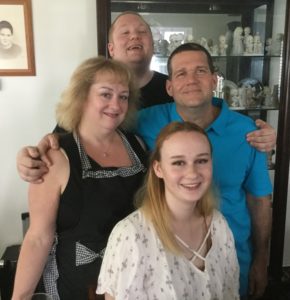
Blog writer Brandon Garrick with his loving parents Laurie and Chris, celebrating his sister Lillianne’s high school graduation.
I am by no means comparing the overall negative stigma faced by Muslims to that of atheists. However, as I identify as an atheist, I can often recall past misconceptions I have heard from those around me. Atheism and agnosticism are on the rise, but currently we are still overly misrepresented in many social spectrums. Muslims are much more prevalent than atheists in the world and in the United States. And we atheists often have to defend our philosophy against ridicule from other religions.
Anyway here are my five misconceptions that I have noticed about Atheists.
1. Atheists hate God. This is a misconception that I often hear when I tell people I am an atheist. However the misconception is far from factual; simply because I don’t believe in God or any higher power above the natural world does not mean I hate God. For example I don’t believe in Unicorns, but I don’t hate Unicorns? Though I am not relating the belief in God to Unicorns, I do want to illustrate the difference between not believing in something and hating something.
2. Something happened to you when you were younger. This misconception is outrageous, in the idea that something had to happen for me to think a certain way. Most Atheists originate from formal religion, but that doesn’t mean something had to occur to change their mindset. In addition most individuals are thrown into religion when they are young and unable to challenge anything. I have grown up and developed a new mindset and philosophy, but nothing bad had to happen me. In fact, I have been raised in a supportive and loving family with my parents who have had a wonderful marriage of over 25 years, and an awesome sister and brother.
3. Atheists have no morals. Society and social relationships can teach a individual morals. You can develop morals from family, friends, education, literature, etc. The idea that you only have morals if you are religious is incorrect. I have plenty of strong morals and contribute to my community by often volunteering with organizations such as Special Olympics, the LGBTQ center, and S.P.C.A of Wake County.
4. Atheists are unhappy without God. I have often been told, “I hope you see the light” or “I hope you find God”, as if there is something wrong with me. The misconception of Atheists being unhappy because they don’t have God is incorrect. I am very happy and excited about where my life is going. I am in graduate school and am applying for PhD. programs soon. I am happy from my natural life, and don’t need a spiritual force to make me happy. However for the people who have relationships with a higher power and its gives them happiness, Great!
5. Atheists hate other religions. I don’t hate other religions, and am actually glad that other people believe in something that gives them happiness. I don’t make fun of other religions, nor try to embarrass people of strong faith. However it would be nice for that respect to be reciprocated, and to not be criticized for what I believe or don’t believe.
* * * * *
See my other “misconception” blogs
Five Misconceptions of Muslims in the USA
Seven Misconceptions or Stereotypes of Hispanic People
Five Common Misconceptions About Gay People
* * * * *




